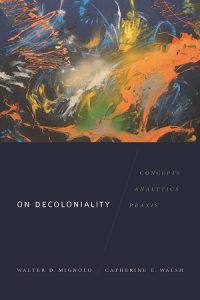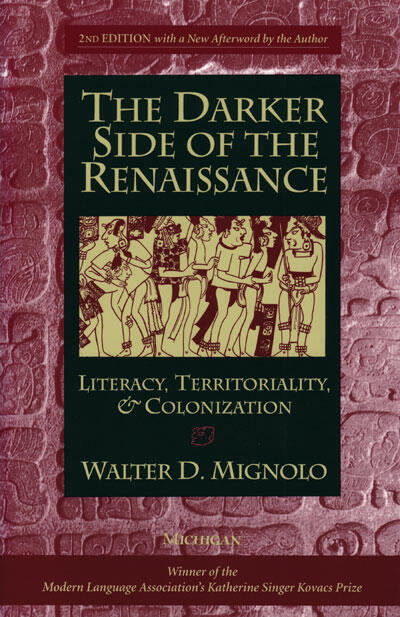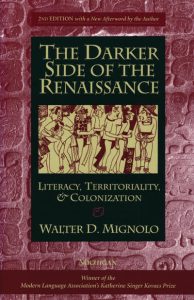A PANEL DISCUSSION ON
DECOLONIZATION/DECOLONIALITY, PART 4
Photo: The Darker Side of the Renaissance. Literacy, Territoriality and Colonization by Walter D. Mignolo
Coloniality and the Danger of Epistemic Violence
(This is the second interview report with a Panel on Decolonization/Decoloniality. For the transcript, see YouTube https://youtube.com/watch?v=WG0wn62xjtc.
Proponents of decoloniality have always denounced accusations of their being romantic with colonial history. Therefore, this complicates the process of genuine understanding and appraisal of their instituted concepts: coloniality and decoloniality. Nonetheless, they are unfazed by this indictment, which they often attribute to the vague or limited understanding that some scholars, especially their critics, supposedly have of both concepts. However, without addressing the underlying “misconceptions” against them or resolving these “misconceptions” in their favour, they instead often advance arguments to respond to the very issue they believe prompted their reactions in the first place. It goes without saying that concepts should benefit more from a clarity of explanation so that the enunciation of underlying ideas will not complicate the process of human understanding.
Coloniality, decoloniality, colonization, and even decolonization are interrelated concepts that will not make sense unless some phenomena receive substantial explanations. Scholars, including Professors Walter D. Mignolo, Sabelo Ndlovu-Gatsheni, Shose Kessi, and Julia Suarez, among others, have opined that the understanding of these concepts requires the interrogation of modernization and even modernity. This is necessary if the audience wants to have a clear understanding and profound knowledge of all the interwoven ideas and concepts. A thread of consistency runs through their arguments that every conceptual idea such as this has its historical foundation, which, when traced, would bring out the layers of realities that birthed it.

Photo: Professor Walter D. Mignolo
If, in line with the arguments of decoloniality scholars, the understanding of the concept rests on unpacking what is understood by modernity, it mandates us to extend our searchlight on that concept itself. Professor Mignolo is never tired of making the connection between decoloniality and modernity. I centre my reflections on Mignolo’s take, although we may differ in what we stress, the contents, and the location of the arguments.
Modernity implies the process of developing one’s sociocultural, sociopolitical, and socioeconomic conditions by relying on history to create a future. By this awareness, modernity means a byproduct of a careful examination of one’s past to project a future that is anchored on enduringly positive results. Premised on this understanding, one can, therefore, argue that every group of people arrives at their modernity based on their collective perception of a desirable future. Thus, modernization means the systematic ways and systems employed by a people for the actualization of their agenda on modernity. It should be obvious that modernization itself signifies the process of attaining a level of excellence designed to function in predetermined ways. In that case, the modernization process need not enjoy a universal application. The simple reason is that various groups have evolved varying strategies for development and progress in line with their historical realities. As such, much as the project of modernity is something everyone looks up to and wants to achieve, they have evolved varying strategies to actualize it. In essence, the idea of a universal modernity has been severely punctured by this reality.
Decolonization and decoloniality, therefore, are understood not necessarily within the reference network with which they are associated but within the universe of meaning where they operate. In that case, the argument about time or time frame, especially as it relates to the beginning or the end of colonial encounters, does not exhaust the significant meaning in negotiating the significance of the concepts. By implication, understanding these concepts begins by delinking the connections that they have with the history and dialectics of time, in which case they could have been comfortably premised on or situated within the experiences that people had during colonialism and colonization.

Photo: Delinking: The Rhetoric of Modernity, the Logic of Coloniality and the Grammar of Decoloniality, 2007) by Walter D. Mignolo
In the same way that modernity and modernization are not the same, so also are the concepts of coloniality and colonization different. The former is a project and an envisioning, but the latter is the mechanisms constructed for the actualization of the former. The takeaway from here is that the project of modernity, as conceived by the West, is achieved through colonization, which means that its arrangement is incapable of disruption even if the oppressed desire progress in whatever form. In essence, modernity itself can never be understood by locating it within a specific timeframe, as is rife in the contemporary universalist discourses. Except for people whose ascension to global relevance is pegged around a proximal history, modernity is a continuous process arrived at by every group of people, irrespective of their racial peculiarities, at their own pace.
Contrary to the misconception that coloniality shares borderline semblance with colonization projects, scholars have opined that it is the logic of oppression, dispossession, despoliation, and dislocation of indigenous structures and values, epistemic traditions and virtues, political infrastructures and systems, economic paradigms, and ideas. A monopolized atmosphere exists for the enhancement of Eurocentrism at an unprecedented height. In essence, when the average human in the 21st century is fixated on imposing Eurocentric modernity as the locus of ideas which is employed to examine and even evaluate others, that logically draws upon a conclusion that they have inadvertently internalized these universalist ideals, with the implications of, directly or indirectly, promoting a singular perspective. At a surface exploration, the modus operandi of these exploitative adventures is hidden as people inadvertently believe that the philosophical foundations that conceived the modernity they are today enjoying are devoid of exploitative and predatory intentions.
However, a deeper reflection will be seen through the undersides of some unwholesome ideas around modernity. For instance, the devastation of other people’s epistemic traditions and heritage, the bludgeoning of the people’s political systems, the desecration of other people’s theological inspiration, and the denigration of their ideological philosophy, among other things, are indications of the dangerous problems connected to these coloniality and decoloniality debates.
On the other hand, decoloniality emerges from a vision of re-existence, which, on the surface, invalidates the ideals of modernity as projected by the universalist advocates while, on a deeper level, crusades for the progressive reconnection with indigenous epistemology towards the recreation and reincarnation of values as perceived by individual groups. These include Latin Americans, Africans, Indians, Australians, and others who have a history with European and American-centric modernity. Decoloniality, to that extent, challenges the universal model of modernity that hides coloniality in all its forms. It is a process of problem-solving awareness which elicits internal reactions against the universalization of ideas for coloniality purposes. Be that as it may, decolonization, therefore, depicts the various means by which every group decides to pursue its decolonial agenda, especially in recognition of its own specific and unique history. If that is the case, the decolonization process of Africans will not be the same as that in Latin America. The same goes for the Indians and Australians. The reason is the simple fact that their local histories and heritages differ in actual reality.

Photo: On Decoloniality: Concepts, Analysis, Praxis, by Walter D. Mignolo, co-authored with Catherine E. Walsh
Premised on this condition, it is therefore inevitable to argue that people who have already immersed themselves in coloniality will always conceive a singular approach to understanding things, opposing in strong terms other contrary views rooted in indigenous thinking. The implications of decoloniality are numerous, some of them finding a perfect expression in the analogues supplied below. The concept of justice and equality, which have, for example, gained prominence in the contemporary African world, was inherited from colonial imperialists. Meanwhile, such a concept undermines local history, especially in relation to how it sees justice and peacemaking. The continuation of such a system of coloniality without questioning has, therefore, occasioned problems of unquantifiable magnitude. “Justice’ is dished without as much thought being given to its impacts on the sociological infrastructure of the people. A decoloniality scholar in this area of knowledge would have, therefore, brought forth justice ideals and ideas that are produced from the indigenous history so that it would generate a social justice most tailored towards addressing their sociocultural sentiment and sensitivities. The same thing can be associated with the medical profession. Medical practitioners who study in Western schools have acquired one perspective on solving medical problems during their training. Their knowledge, however, is limited, as it is blind to certain medical histories and practices of people that incorporate their cultural understanding of sickness. Decoloniality scholars, therefore, are convinced that the progressive decolonization of these systems, including, but not limited to, the mentioned ones, would always bring about decoloniality of some sort. Reconstitution, re-existence, and re-imaginings are essential to decoloniality and decolonization.















You must be logged in to post a comment.